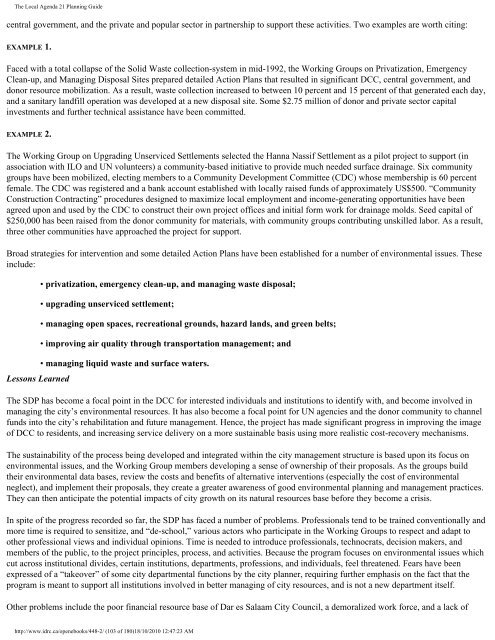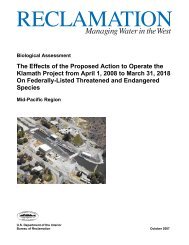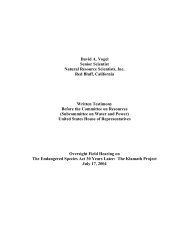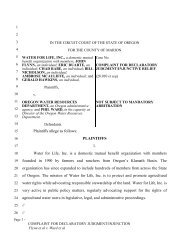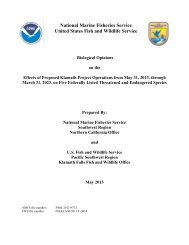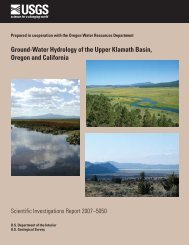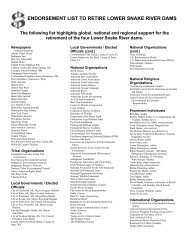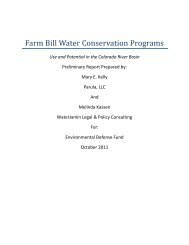The Local Agenda 21 Planning Guide - Democrats Against UN ...
The Local Agenda 21 Planning Guide - Democrats Against UN ...
The Local Agenda 21 Planning Guide - Democrats Against UN ...
Create successful ePaper yourself
Turn your PDF publications into a flip-book with our unique Google optimized e-Paper software.
<strong>The</strong> <strong>Local</strong> <strong>Agenda</strong> <strong>21</strong> <strong>Planning</strong> <strong>Guide</strong><br />
central government, and the private and popular sector in partnership to support these activities. Two examples are worth citing:<br />
EXAMPLE 1.<br />
Faced with a total collapse of the Solid Waste collection-system in mid-1992, the Working Groups on Privatization, Emergency<br />
Clean-up, and Managing Disposal Sites prepared detailed Action Plans that resulted in significant DCC, central government, and<br />
donor resource mobilization. As a result, waste collection increased to between 10 percent and 15 percent of that generated each day,<br />
and a sanitary landfill operation was developed at a new disposal site. Some $2.75 million of donor and private sector capital<br />
investments and further technical assistance have been committed.<br />
EXAMPLE 2.<br />
<strong>The</strong> Working Group on Upgrading Unserviced Settlements selected the Hanna Nassif Settlement as a pilot project to support (in<br />
association with ILO and <strong>UN</strong> volunteers) a community-based initiative to provide much needed surface drainage. Six community<br />
groups have been mobilized, electing members to a Community Development Committee (CDC) whose membership is 60 percent<br />
female. <strong>The</strong> CDC was registered and a bank account established with locally raised funds of approximately US$500. “Community<br />
Construction Contracting” procedures designed to maximize local employment and income-generating opportunities have been<br />
agreed upon and used by the CDC to construct their own project offices and initial form work for drainage molds. Seed capital of<br />
$250,000 has been raised from the donor community for materials, with community groups contributing unskilled labor. As a result,<br />
three other communities have approached the project for support.<br />
Broad strategies for intervention and some detailed Action Plans have been established for a number of environmental issues. <strong>The</strong>se<br />
include:<br />
• privatization, emergency clean-up, and managing waste disposal;<br />
• upgrading unserviced settlement;<br />
• managing open spaces, recreational grounds, hazard lands, and green belts;<br />
• improving air quality through transportation management; and<br />
• managing liquid waste and surface waters.<br />
Lessons Learned<br />
<strong>The</strong> SDP has become a focal point in the DCC for interested individuals and institutions to identify with, and become involved in<br />
managing the city’s environmental resources. It has also become a focal point for <strong>UN</strong> agencies and the donor community to channel<br />
funds into the city’s rehabilitation and future management. Hence, the project has made significant progress in improving the image<br />
of DCC to residents, and increasing service delivery on a more sustainable basis using more realistic cost-recovery mechanisms.<br />
<strong>The</strong> sustainability of the process being developed and integrated within the city management structure is based upon its focus on<br />
environmental issues, and the Working Group members developing a sense of ownership of their proposals. As the groups build<br />
their environmental data bases, review the costs and benefits of alternative interventions (especially the cost of environmental<br />
neglect), and implement their proposals, they create a greater awareness of good environmental planning and management practices.<br />
<strong>The</strong>y can then anticipate the potential impacts of city growth on its natural resources base before they become a crisis.<br />
In spite of the progress recorded so far, the SDP has faced a number of problems. Professionals tend to be trained conventionally and<br />
more time is required to sensitize, and “de-school,” various actors who participate in the Working Groups to respect and adapt to<br />
other professional views and individual opinions. Time is needed to introduce professionals, technocrats, decision makers, and<br />
members of the public, to the project principles, process, and activities. Because the program focuses on environmental issues which<br />
cut across institutional divides, certain institutions, departments, professions, and individuals, feel threatened. Fears have been<br />
expressed of a “takeover” of some city departmental functions by the city planner, requiring further emphasis on the fact that the<br />
program is meant to support all institutions involved in better managing of city resources, and is not a new department itself.<br />
Other problems include the poor financial resource base of Dar es Salaam City Council, a demoralized work force, and a lack of<br />
http://www.idrc.ca/openebooks/448-2/ (103 of 180)18/10/2010 12:47:23 AM


